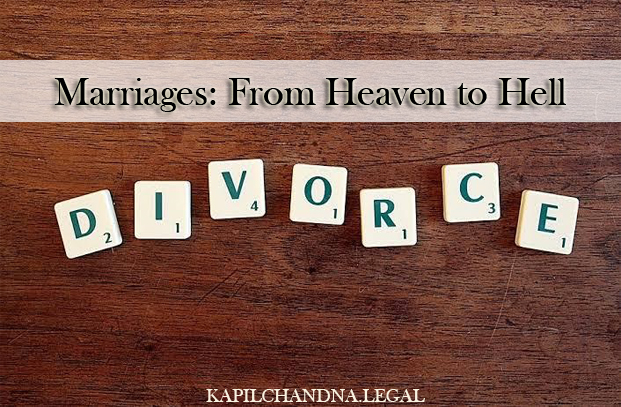Marriages: From Heaven to Hell
Marriages are made in heaven and everyone getting into this sanctimonious relationship would expect a blissful, peaceful and loving life with their better half. But this dream of living a happy, peaceful and loving life sometimes turn into hell on earth and makes it even impossible to live their better half under one roof.
To deal with the situation of marriages turning from heaven to hell, the law under Section 13(1)(ia) of The Hindu Marriage Act, 1955 has provided cruelty as one of the ground for divorce, meaning any spouse being treated with a cruelty is entitled to seek for dissolution of the marriage.
Thought the term cruelty is not defined anywhere in law, the Courts in India have taken the responsibility to explain the term cruelty.
Hon’ble Supreme Court on Cruelty:-
In the case of Sbhoba Rani vs. Madhukar Reddi reported in (1988) 1 SCC 105, this Court had an occasion to examine the concept of cruelty. The word ‘cruelty’ has not been defined in the Hindu Marriage Act. It has been used in Section 13(1)(i)(a) of the Act in the context of human conduct or behaviour in relation to or in respect of matrimonial duties or obligations.
It is a course of conduct of one which is adversely affecting the other.
The cruelty may be mental or physical, intentional or unintentional.
If it is physical, it is a question of fact and degree.
If it is mental, the enquiry must begin as to the nature of the cruel treatment and then as to the impact of such treatment on the mind of the spouse.
Whether it caused reasonable apprehension that it would be harmful or injurious to live with the other, ultimately, is a matter of inference to be drawn by taking into account the nature of the conduct and its effect on the complaining spouse.
There may, however, be cases where the conduct complained of itself is bad enough and per se unlawful or illegal. Then the impact or the injurious effect on the other spouse need not be enquired into or considered.
In such cases, the cruelty will be established if the conduct itself is proved or admitted.
The absence of intention should not make any difference in the case, if by ordinary sense in human affairs, the act complained of could otherwise be regarded as cruelty.
Intention is not a necessary element in cruelty. The relief to the party cannot be denied on the ground that there has been no deliberate or wilful ill-treatment.
The cruelty alleged may largely depend upon the type of life the parties are accustomed to or their economic and social conditions and their culture and human values to which they attach importance. Each case has to be decided on its own merits.
In the case of V. Bhagat vs. D. Bhagat reported in (1994) 1 SCC 337, this Court had occasion to examine the concept of ‘mental cruelty’. This Court observed as under:
“16. Mental cruelty in Section 13(1) (i-a) can broadly be defined as that conduct which inflicts upon the other party such mental pain and suffering as would make it not possible for that party to live with the other.
In other words, mental cruelty must be of such a nature that the parties cannot reasonably be expected to live together. The situation must be such that the wronged party cannot reasonably be asked to put up with such conduct and continue to live with the other party.
It is not necessary to prove that the mental cruelty is such as to cause injury to the health of the petitioner. While arriving at such conclusion, regard must be had to the social status, educational level of the parties, the society they move in, the possibility or otherwise of the parties ever living together in case they are already living apart and all other relevant facts and circumstances which it is neither possible nor desirable to set out exhaustively.
What is cruelty in one case may not amount to cruelty in another case. It is a matter to be decided in each case having regard to the facts and circumstances of that case.
If it is a case of accusations and allegations, regard must also be had to the context in which they were made.”
Again in A. Jaychandra v. Aneel Kumar, (2005) 2 SCC 22, a 3 judge Bench of this Court observed that:-
“To constitute cruelty, the conduct complained of should be “grave and weighty” so as to come to the conclusion that the petitioner spouse cannot be reasonably expected to live with the other spouse. It must be something more serious than “ordinary wear and tear of married life”.
The conduct taking into consideration the circumstances and background has to be examined to reach the conclusion whether the conduct complained of amounts to cruelty in the matrimonial law.
Conduct has to be considered, as noted above, in the background of several factors such as social status of parties, their education, physical and mental conditions, customs and traditions. It is difficult to lay down a precise definition or to give exhaustive description of the circumstances, which would constitute cruelty.
It must be of the type as to satisfy the conscience of the Court that the relationship between the parties had deteriorated to such extent due to the conduct of the other spouse that it would be impossible for them to live together without mental agony, torture or distress, to entitle the complaining spouse to secure divorce.
Physical violence is not absolutely essential to constitute cruelty and a consistent course of conduct inflicting immeasurable mental agony and torture may well constitute cruelty within the meaning of of the Act.
Mental cruelty may consist of verbal abuses and insults by using filthy and abusive language leading to constant disturbance of mental peace of the other party.
In Vinita Saxena vs. Pankaj Pandit (2006) 3 SCC 778 regarding legal proposition on aspect of cruelty has made the following observations:
“31. It is settled by a catena of decisions that mental cruelty can cause even more serious injury than the physical harm and create in the mind of the injured appellant such apprehension as is contemplated in the section. It is to be determined on whole facts of the case and the matrimonial relations between the spouses.
To amount to cruelty, there must be such wilful treatment of the party which caused suffering in body or mind either as an actual fact or by way of apprehension in such a manner as to render the continued living together of spouses harmful or injurious having regard to the circumstances of the case.
The word “cruelty” has not been defined and it has been used in relation to human conduct or human behaviour. It is the conduct in relation to or in respect of matrimonial duties and obligations. It is a course of conduct and one which is adversely affecting the other. The cruelty may be mental or physical, intentional or unintentional. There may be cases where the conduct complained of itself is bad enough and per se unlawful or illegal. Then the [pic]impact or the injurious effect on the other spouse need not be enquired into or considered. In such cases, the cruelty will be established if the conduct itself is proved or admitted.”
A Bench of Three Judges of this Court in Samar Ghosh vs. Jaya Ghosh (2007) 4 SCC 511 has enumerated some of the illustrations of mental cruelty.
Paragraph 101 of the said case is being reproduced below: “101. No uniform standard can ever be laid down for guidance, yet we deem it appropriate to enumerate some instances of human behaviour which may be relevant in dealing with the cases of “mental cruelty”. The instances indicated in the succeeding paragraphs are only illustrative and not exhaustive:
- On consideration of complete matrimonial life of the parties, acute mental pain, agony and suffering as would not make possible for the parties to live with each other could come within the broad parameters of mental cruelty.
- On comprehensive appraisal of the entire matrimonial life of the parties, it becomes abundantly clear that situation is such that the wronged party cannot reasonably be asked to put up with such conduct and continue to live with other party.
- Mere coldness or lack of affection cannot amount to cruelty, frequent rudeness of language, petulance of manner, indifference and neglect may reach such a degree that it makes the married life for the other spouse absolutely intolerable.
- Mental cruelty is a state of mind. The feeling of deep anguish, disappointment, frustration in one spouse caused by the conduct of other for a long time may lead to mental cruelty.
- A sustained course of abusive and humiliating treatment calculated to torture, discommode or render miserable life of the spouse.
- Sustained unjustifiable conduct and behaviour of one spouse actually affecting physical and mental health of the other spouse. The treatment complained of and the resultant danger or apprehension must be very grave, substantial and weighty.
- Sustained reprehensible conduct, studied neglect, indifference or total departure from the normal standard of conjugal kindness causing injury to mental health or deriving sadistic pleasure can also amount to mental cruelty.
- The conduct must be much more than jealousy, selfishness, possessiveness, which causes unhappiness and dissatisfaction and emotional upset may not be a ground for grant of divorce on the ground of mental cruelty.
- Mere trivial irritations, quarrels, normal wear and tear of the married life which happens in day-to-day life would not be adequate for grant of divorce on the ground of mental cruelty.
- The married life should be reviewed as a whole and a few isolated instances over a period of years will not amount to cruelty. The ill conduct must be persistent for a fairly lengthy period, where the relationship has deteriorated to an extent that because of the acts and behaviour of a spouse, the wronged party finds it extremely difficult to live with the other party any longer, may amount to mental cruelty.
- If a husband submits himself for an operation of sterilisation without medical reasons and without the consent or knowledge of his wife and similarly, if the wife undergoes vasectomy or abortion without medical reason or without the consent or knowledge of her husband, such an act of the spouse may lead to mental cruelty.
- Unilateral decision of refusal to have intercourse for considerable period without there being any physical incapacity or valid reason may amount to mental cruelty.
- Unilateral decision of either husband or wife after marriage not to have child from the marriage may amount to cruelty.
The law in its wisdom thinking of a situation where parties may not wish to file divorce at the first sight and want to give another chance to save their pious relationship, had provided a right to file Judicial Separation (living apart for a certain period without getting divorced) under Section 10 The Hindu Marriage Act,1955.
Therefore, the spouses alleging cruelty can either file for Judicial Separation (living apart for a certain period without getting divorced) or directly file for divorce under Section 13 (1) (ia) of The Hindu Marriage Act,1955.




